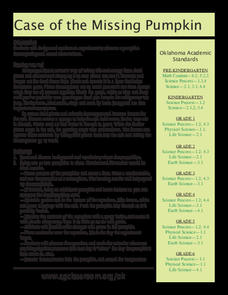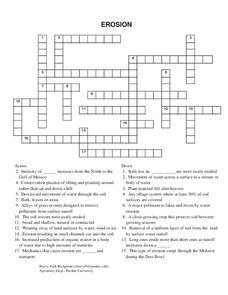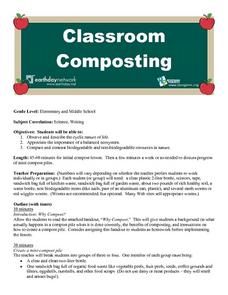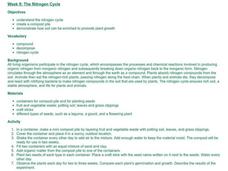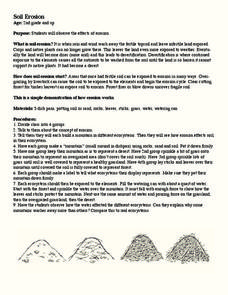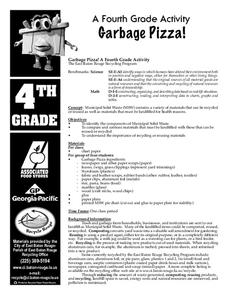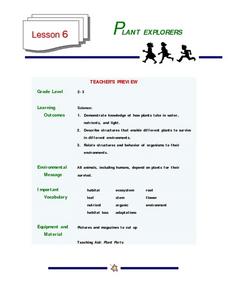Curated OER
How Does Your Garden Grow?
Young gardners read and listen to books about seeds, plants, and the growing process. They plant seeds in plastic cups to observe the process of root-growing and plant formation. The whole class walks through a field to collect seeds...
Center Science Education
Feeling the Heat
What is an urban heat island? Middle school meteorologists find out by comparing temperatures at different locations on campus. They relate their findings to what might be happening in a concrete jungle and how it impacts local weather....
Global Oneness Project
Living with Less Water
Did you know that California produces two thirds of the fruits and nuts consumed in the United States? That it produces almost one third of the vegetables? Did you know that scientists warn that California is facing the onset of a...
Scholastic
Spring Is Sprung: Water Movement in Plants
Young scientists use food coloring and celery stalks to determine how water travels through plants.
KOG Ranger Program
Campfire Safety
Make sure that campfire is completely out before packing up your campsite! A straightforward and informational worksheet encourages learners to match pictures to the sequential steps needed to safely extinguish a campfire, and to note...
Curated OER
Koi Pond
Create this beautiful koi pond scene using watercolor paper, crayons, and paints. This would be a fantastic project to link to a scientific study of pond life or a historical study of Japanese culture.
Curated OER
Feeling the Heat
Pupils record temperatures at different locations around campus. They examine the results and draw conclusions about how materials and colors affect the amount of heat produced. They also analyze Los Angeles' temperature records over a...
Curated OER
Case of the Missing Pumpkin
Scientists define and discuss decomposition, and watch pumpkins decompose and return to soil in classroom experiment. They record the date the experiment began, chart changes in pumpkins on a calendar, count how many days it takes...
Curated OER
Drip... Drop... Raindrops
Students demonstrate the steps of evaporation, cloud formation, and precipitation within the water cycle. They make and demonstrate how to use a hygrometer to record daily humidity and describe how rain, snow, and sleet form.
Curated OER
Recyclers to the Rescue
Producers, consumers, food chains, and plants are the stars of this science instructional activity. Learners take part in an inquiry which helps them to discover the most effective and efficient way to grow a producer. They have a...
Curated OER
Erosion
In this erosion worksheet, students complete a crossword puzzle given 17 clues about the types of erosion, the causes of erosion and the results of erosion.
Curated OER
Wisconsin Agriculture; Berry Bunch's Cherry Fast Facts
Students explore agriculture by researching Wisconsin's economy. In this cherry industry lesson, students read assigned text about the amount of cherries Wisconsin produces annually and the revenue it brings in to the state. Students...
K12 Reader
Taiga Ecosystems
Introduce your class to another type of ecosystem, the taiga ecosystem, through a reading passage. Class members read the text and then respond to five reading questions about the content of the passage.
California Academy of Science
Poetic Reflections
Poetry is a wonderful way to explore language, express topical understanding, and incite creative thinking. After a trip to the local natural history museum (or zoo), learners write an acrostic or a cinquain poem describing one of their...
US Environmental Protection Agency
Non-Point Source Pollution
Investigate the different types of pollution that storm drain runoff carries into oceans, lakes, rivers, and streams with this class demonstration. Using an aquarium and an assortment of everyday items that contaminants like motor oil,...
Alabama Wildlife Federation
Wildlife Habitat Checklist
Take a walk on the wild side with a project about animal habitats. After kids observe a chosen animal in its home, they describe the animal's food and water sources, shelter, and how it raises its young. They then write a short fictional...
Curated OER
Classroom Composting
Pupils discover the benefits of composting. They identify the steps of decomposition as well. They are read a book and discuss what items decompose.
Curated OER
The Nitrogen Cycle
Students design and create a compost pile in order to study the Nitrogen Cycle. They then use the scientific method to determine if plants grow better when they add organic matter from their compost pile to the plant's soil.
Curated OER
Soil Erosion
Second graders complete activities to observe the effects of erosion. In this erosion lesson, 2nd graders define erosion and learn the process. Students complete an erosion experiment.
Curated OER
Garbage Pizza
Fourth graders explore the concept of waste management. In this recycling lesson, 4th graders identify materials that must be landfilled as well as items that may be recycled or reused.
Curated OER
Plant Explorers
Students investigate how plants take in water, nutrients, and light. They create artwork showing how plants survive in different environments.
Curated OER
The right place to live
How do various plants survive in different environments? They adapt! Kids determine which plant traits make them perfect for their specific environment. They consider three plants and can even complete a plant experiment. Note: Intended...
Curated OER
Composting
Using 2-liter bottles, junior ecologists create composting tubes in which they place nitrogen-rich and carbon-rich materials. They observe what changes occur over two weeks' time. Provide more specific direction to your class as to what...
Curated OER
Prairie Senses
Second graders use their senses to explore a prairie or imaginary prairie. They draw pictures to represent the five senses and discover how an artist describes non-visual sensations in a visual way.









